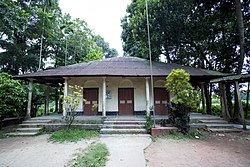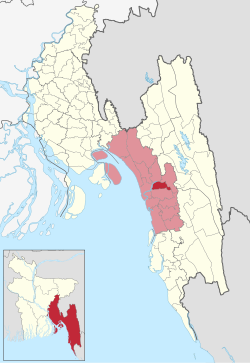Boalkhali Upazila
Boalkhali
বোয়ালখালী | |
|---|---|
 Kadurkhil High School | |
 | |
| Coordinates: 22°22.7′N 91°55.2′E / 22.3783°N 91.9200°E | |
| Country | |
| Division | Chittagong |
| District | Chittagong |
| Jatiya Sangsad constituency | Chittagong-8 |
| Headquarters | Boalkhali Upazila Complex |
| Government | |
| • Body | Upazila Council |
| • MP | Vacant |
| • Chairman | Vacant |
| Area | |
| • Total | 126.46 km2 (48.83 sq mi) |
| Population | |
| • Total | 258,688 |
| • Density | 2,000/km2 (5,300/sq mi) |
| Time zone | UTC+6 (BST) |
| Postal code | 4366[2] |
| Area code | 03032[3] |
| Website | boalkhali |
Boalkhali (Bengali: বোয়ালখালী) is an upazila of Chattogram District in Chattogram Division, Bangladesh.[4]
Geography
[edit]Boalkhali is located at 22°22′40″N 91°55′15″E / 22.3778°N 91.9208°E. It had 44108 households and its total area is 126.46 km2.[4]
According to the 2001 Bangladesh Census, there were 36,588 households.
Demographics
[edit]As of the 2011 Census of Bangladesh, Boalkhali upazila had 44,108 households and a population of 223,125. 46,730 (20.94%) were under 10 years of age. Boalkhali had an average literacy rate of 58.90%, compared to the national average of 51.8%, and a sex ratio of 1042 females per 1000 males. 31,206 (13.99%) of the population lived in urban areas.[6][7]
As of the 2001 Bangladesh census, the population was 201,590, comprising 104,601 males and 96,989 females. Boalkhali had 9 Unions, 31 Mauza and 30 villages and the literacy rate was 71.8%.[8]
As of the 1991 Bangladesh census, Boalkhali has a population of 195607. Males constitute 51.75% of the population, and females 48.25%. This Upazila's eighteen up population is 98116. Boalkhali has an average literacy rate of 48.5% (7+ years), and the national average of 32.4% literate.[9]
Economy
[edit]Agriculture and manufacturing are the two major economic sectors in Boalkhali. The main crops grown here are Paddy, Mustards, Onion, Garlic, Chili and other vegetables. The KorolDenga hills are very fertile for cultivating fruits. The main fruits cultivated here are Jackfruit, Mango, Olive, Papaya, Guava, Kamranga, Banana, KoshshoGula, FyinnaGula, Boththa, Aamra, Pineapple, Lemon and Jambura. The main trees planted in the Koroldenga hills are Agar, Rubber and Teak. The bank of Karnafuli River is also very fertile for cultivation. There are so many fisheries, dairies and poultries in Boalkhali Upazila.
There are a lot of Hats and Bazars in Boalkhali. Hazir Hat, Chowdhury Hat, Munsi Hut, Jomadar Hat etc. are famous Bazar.
The transportation of Boalkhali Upazila is very developed compare to other parts of the country. People can navigate through Karnafuli River, Rail, Bus, Tempoo, CNG (Local Taxi). For Rail there are two stations one in Gomdandi and another one in Bengura.
Administration
[edit]Boalkhali Upazila is divided into Boalkhali Municipality and nine union parishads: Ahla Karaldenga, Amuchia, Charandwip, Kandhurkhil, Paschim Gamdandi, Popadia, Sakpura, Saroatali, and Sreepur Kharandwip. The union parishads are subdivided into 31 mauzas and 33 villages.[10]
Boalkhali Municipality was formed by nine wards in 2012 and is located by the whole Former East Gondandi Union, West Gomdandi unit 1 to 6 and Khadurkhil unit 1 to 3 from Union Parishod.
Mayor
Upazila Chairman:
Vice Chairman:
Woman Vice Chairman:
Upazila Nirbahi Officer (UNO):
- Mohammad Mamun[11]
Notable residents
[edit]- Abdul Wahid Bengali (1850-1905), theologian, teacher and social reformer
- Binod Bihari Chowdhury, revolutionary, was born at Uttar Bhurshi village in 1911.[12]
- Kalpana Datta, revolutionary, was born at Sreepur village in 1913.[13]
- Shefali Ghosh, singer, was born at Kanungo Para village circa 1941.[14]
- Rama Chowdhury-War heroine of Bangladesh Liberation war.
- Chinmoy Kumar Ghosh - Philosopher, Peace Meditations at the United Nations 1931
See also
[edit]References
[edit]- ^ National Report (PDF). Population and Housing Census 2022. Vol. 1. Dhaka: Bangladesh Bureau of Statistics. November 2023. p. 396. ISBN 978-9844752016.
- ^ "Bangladesh Postal Code". Dhaka: Bangladesh Postal Department under the Department of Posts and Telecommunications of the Ministry of Posts, Telecommunications and Information Technology of the People's Republic of Bangladesh. 20 October 2024.
- ^ "Bangladesh Area Code". Stockholm, Sweden: Rebtel.com. 18 October 2024.
- ^ a b Golam Kibria Bhuiyan (2012). "Boalkhali Upazila". In Sirajul Islam and Ahmed A. Jamal (ed.). Banglapedia: National Encyclopedia of Bangladesh (Second ed.). Asiatic Society of Bangladesh.
- ^ Population and Housing Census 2022 - District Report: Chattogram (PDF). District Series. Dhaka: Bangladesh Bureau of Statistics. June 2024. ISBN 978-984-475-247-4.
- ^ "Bangladesh Population and Housing Census 2011 Zila Report – Chittagong" (PDF). bbs.gov.bd. Bangladesh Bureau of Statistics.
- ^ "Community Tables: Chittagong district" (PDF). bbs.gov.bd. Bangladesh Bureau of Statistics. 2011.
- ^ "Area, Population and Literacy Rate by Upazila/Thana-2001" (PDF). Bangladesh Bureau of Statistics. Archived from the original (PDF) on 2007-07-04.
- ^ "Population Census Wing, BBS, 1991 data". Archived from the original on 2005-03-27. Retrieved November 10, 2006.
- ^ "District Statistics 2011: Chittagong" (PDF). Bangladesh Bureau of Statistics. Archived from the original (PDF) on 13 November 2014. Retrieved 14 July 2014.
- ^ "Officer List". Boalkhali Upazila.
- ^ "Revolutionary Binod Bihari dies". bdnews24.com. 10 April 2013.
- ^ Bandyopadhyay, Sailesh Kumar (2012). "Datta, Kalpana". In Islam, Sirajul; Jamal, Ahmed A. (eds.). Banglapedia: National Encyclopedia of Bangladesh (Second ed.). Asiatic Society of Bangladesh.
- ^ শেফালী ঘোষ : তার কাছে ঋণ [Shefali Ghosh: Loans to him.]. Risingbd.com (in Bengali). 11 July 2014.
